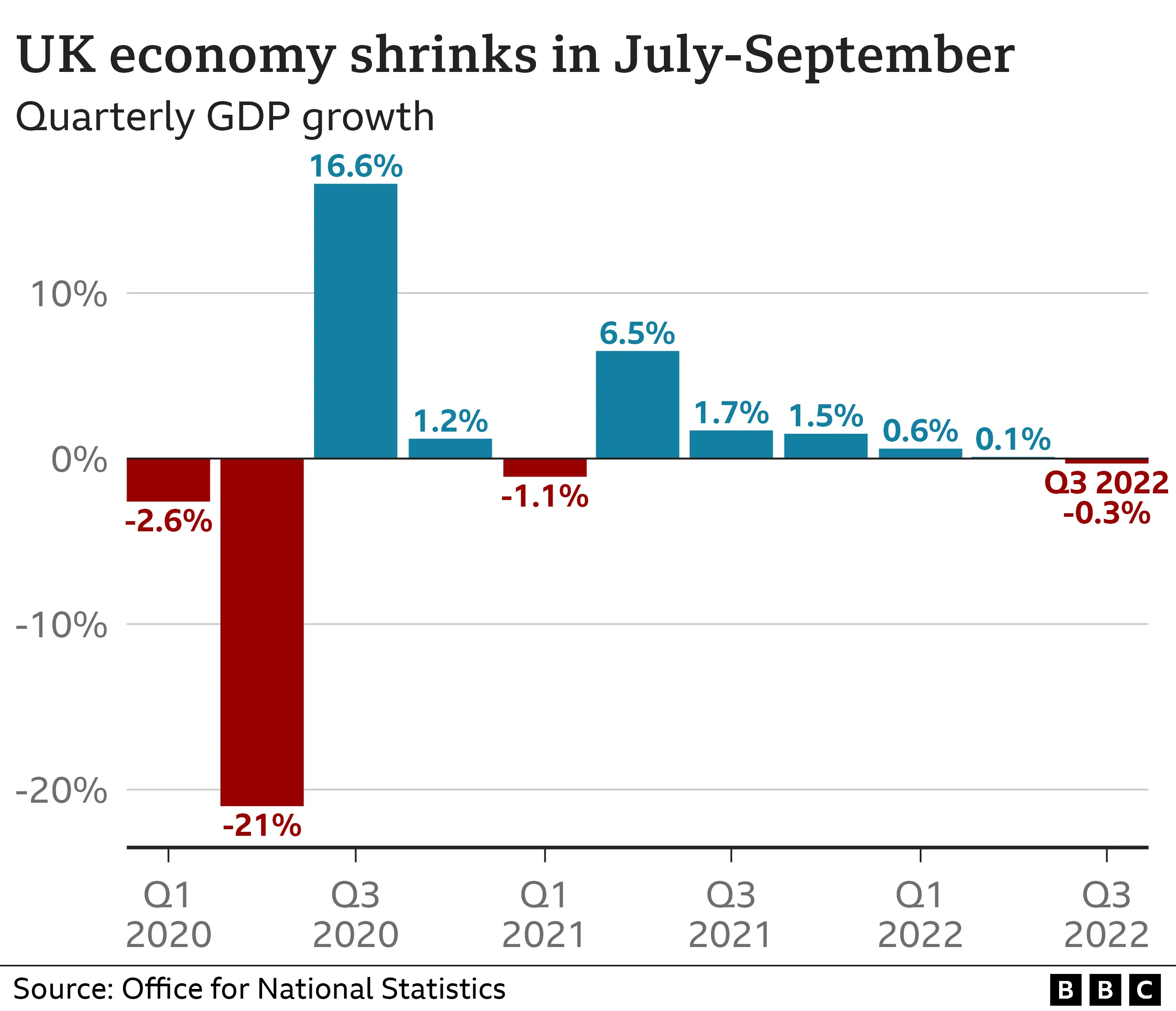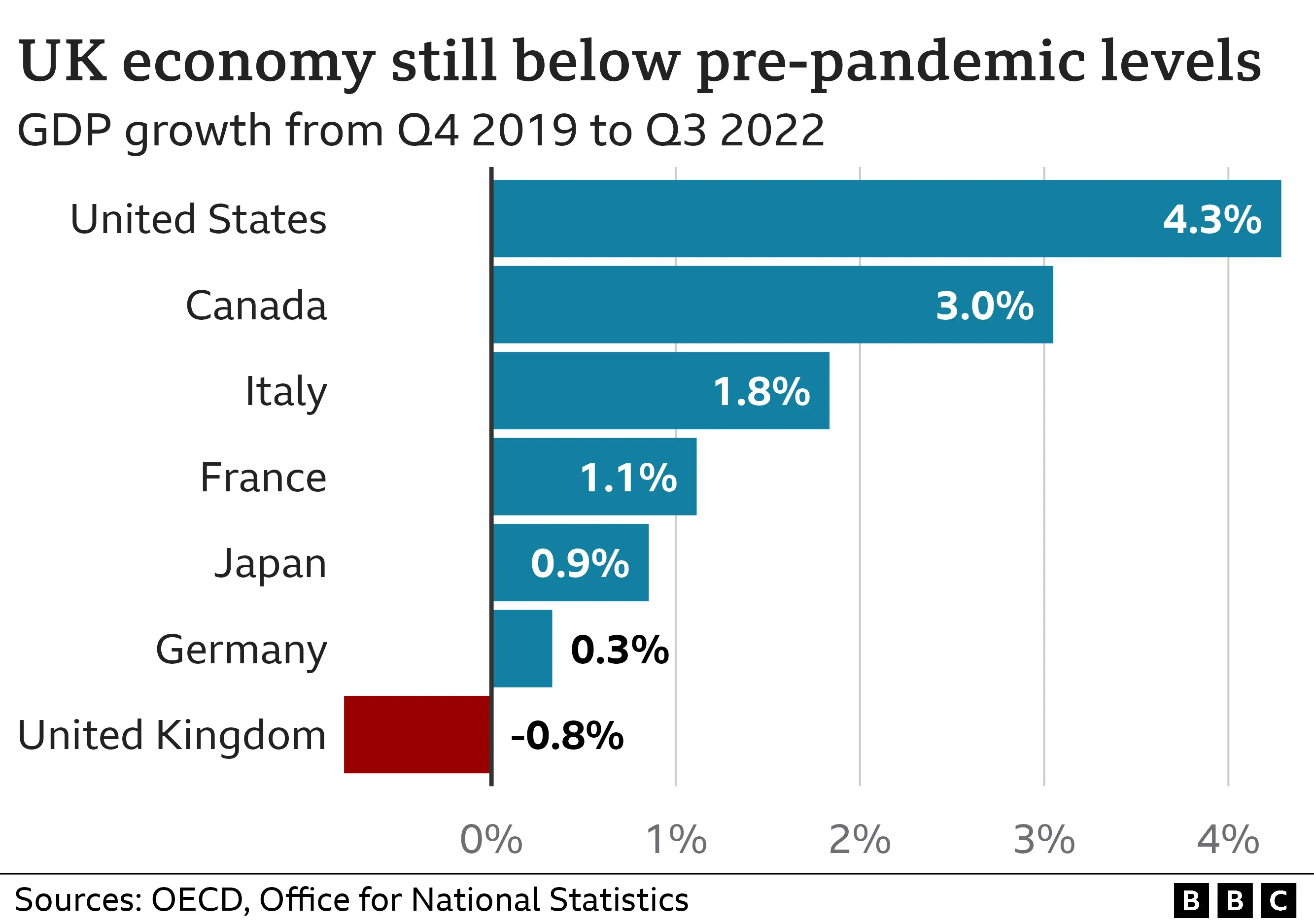UK economy shrank more than previously thought
 Getty Images
Getty ImagesThe UK economy shrank by more than first thought in the three months to September, revised figures show.
The economy contracted by 0.3%, compared with a previous estimate of 0.2%, as business investment performed worse than first thought, the Office for National Statistics (ONS) said.
Growth figures for the first half of 2022 have also been revised down.
The UK is forecast to fall into recession in the final three months of the year as soaring prices hit growth.
A country is considered to be in recession when its economy shrinks for two three-month periods - or quarters - in a row. Typically companies make less money, pay falls and unemployment rises, leaving the government with less money in tax to use on public services.
Darren Morgan, director of economic statistics at the ONS, said: "Our revised figures show the economy performed slightly less well over the last year than we previously estimated", with manufacturing "notably weaker".
He added that household incomes, when accounting for rising prices, continued to fall, and household spending "fell for the first time since the final Covid-19 lockdown in the spring of 2021".
The ONS said that gross domestic product (GDP) - the measure of the size of the economy - was now estimated to be 0.8% below where it was before the pandemic struck, downwardly revised from the previous estimate of 0.4% below.

The economy has been hit as surging energy and food prices push inflation - the rate at which prices rise - to its highest level in 40 years.
It means that consumers are spending less and businesses are cutting investment.
Along with its revision for the July-to-September period, the ONS said the economy also grew less than first estimated in the first half of the year - expanding by 0.6% in the first quarter and 0.1% in the second quarter.
The ONS has previously said growth stood at 0.7% and 0.2% in those quarters respectively.
It is not unusual for the ONS to revise its growth estimates. It produces a first estimate of GDP about 40 days after the quarter in question, at which point only about 60% of the data is available, so the figure is revised later as more information comes in.


We already knew the UK economy shrank in the third quarter of the year while other economies grew. But now the disparity between the UK and the rest of the world looks starker than previously thought.
An economy that remains 0.8% smaller than its pre-pandemic level is in marked contrast to the eurozone - up 2.2% at the last count - or Canada - up by 3%.
The Paris-based think tank the OECD recently forecast in 2023, the UK economy would continue shrinking by more than the rest of the G7, while other economies returned to growth.
There's now a growing body of evidence that some of that underperformance is due to Brexit.

Last week, figures from the ONS indicated that the economy shrank by 0.3% over the August-to-October period.
The government's independent forecaster, the Office for Budget Responsibility (OBR), has warned that the UK will fall into a recession "lasting just over a year".
The OBR has predicted that the economy will shrink by 1.4% in 2023 before growth gradually picks up again.

As a result it expects the unemployment rate to rise and house prices to fall sharply as the Bank of England puts up interest rates to control soaring prices.
Last week, the Bank raised its key rate to 3.5%, the highest level for 14 years, which is pushing up repayment costs for people with mortgages and loans.
The UK is not the only country seeing its economy slow down, with the US and eurozone also expected to fall into recession next year.
However, Gabriella Dickens from Pantheon Macroeconomics said she expected the UK to "suffer the deepest recession among major advanced economies in 2023".
Chancellor Jeremy Hunt blamed Vladimir Putin's invasion of Ukraine for the economic difficulties.
"High inflation driven by Putin's invasion of Ukraine is slowing economic growth across the world. No country is immune, least of all Britain," he said.
But responding to the latest ONS figures, Labour's shadow chancellor Rachel Reeves accused the government of losing control over the economy.
"GDP data has been revised down, leaving the UK with the worst growth in the G7 in the last quarter," she tweeted.
"The Tories have lost control of the economy and are leaving millions of working people paying the price."
